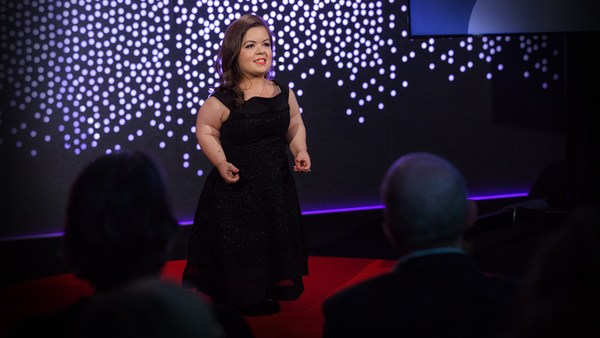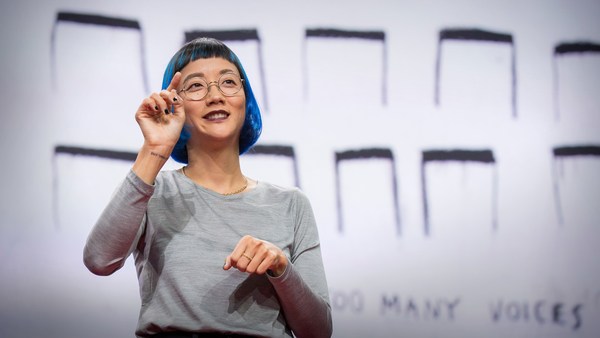My name is Rebecca, and I'm a cyborg.
(Laughter)
Specifically, I have 32 computer chips inside my head, which rebuild my sense of hearing. This is called a cochlear implant. You remember the Borg from Star Trek, those aliens who conquered and absorbed everything in sight? Well, that's me.
(Laughter)
The good news is I come for your technology and not for your human life-forms.
(Laughter)
Actually, I've never seen an episode of Star Trek.
(Laughter)
But there's a reason for that: television wasn't closed-captioned when I was a kid. I grew up profoundly deaf. I went to regular schools, and I had to lip-read. I didn't meet another deaf person until I was 20. Electronics were mostly audio back then. My alarm clock was my sister Barbara, who would set her alarm and then throw something at me to wake up.
(Laughter)
My hearing aids were industrial-strength, sledgehammer volume, but they helped me more than they helped most people. With them, I could hear music and the sound of my own voice. I've always liked the idea that technology can help make the world more human. I used to watch the stereo flash color when the music shifted, and I knew it was just a matter of time before my watch could show me sound, too.
Did you know that hearing occurs in the brain? In your ear is a small organ called the cochlea, and the cochlea is lined with thousands of receptors called hair cells. When sound enters your ear, those hair cells, they send electric signals to your brain, and your brain then interprets that as sound. Hair-cell damage is really common: noise exposure, ordinary aging, illness. My hair cells were damaged before I was even born. My mother was exposed to German measles when she was pregnant with me. About five percent of the world has significant hearing loss. By 2050, that's expected to double to over 900 million people, or one in 10. For seniors, it's already one out of three.
With a cochlear implant, computer chips do the job for the damaged hair cells. Imagine a box of 16 crayons, and those 16 crayons, in combination, have to make all of the colors in the universe. Same with the cochlear implant. I have 16 electrodes in each of my cochleas. Those 16 electrodes, in combination, send signals to my brain, representing all of the sounds in the universe. I have electronics inside and outside of my head to make that happen, including a small processor, magnets inside my skull and a rechargeable power source. Radio waves transmit sound through the magnets. The number one question that I get about the cochlear implant when people hear about the magnets is whether my head sticks to the refrigerator.
(Laughter)
No, it does not.
(Laughter)
(Applause)
Thank you, thank you.
(Applause)
I know this, because I tried.
(Laughter)
Hearing people assume that the Deaf live in a perpetual state of wanting to hear, because they can't imagine any other way. But I've never once wished to be hearing. I just wanted to be part of a community like me. I wanted everyone else to be deaf. I think that sense of belonging is what ultimately connects our stories, and mine felt incomplete.
When cochlear implants first got going, back in the '80s, the operation was Frankenstein-monster scary. By 2001, the procedure had evolved considerably, but it still wiped out any natural hearing that you had. The success rate then for speech comprehension was low, maybe 50 percent. So if it didn't work, you couldn't go back. At that time, implants were also controversial in the Deaf culture. Basically, it was considered the equivalent of changing the color of your skin.
I held off for a while, but my hearing was going downhill fast, and hearing aids were no longer helping. So in 2003, I made the tough decision to have the cochlear implant. I just needed to stop that soul-sucking cycle of loss, regardless of whether the operation worked, and I really didn't think that it would. I saw it as one last box to check off before I made the transition to being completely deaf, which a part of me wanted.
Complete silence is very addictive. Maybe you've spent time in a sensory deprivation tank, and you know what I mean. Silence has mind-expanding capabilities. In silence, I see sound. When I watch a music video without sound, I can hear music. In the absence of sound, my brain fills in the gaps based on the movement I see. My mind is no longer competing with the distraction of sound. It's freed up to think more creatively.
There are advantages to having bionic body parts as well. It's undeniably convenient to be able to hear, and I can turn it off any time I want.
(Laughter)
I'm hearing when I need to be, and the rest of the time, I'm not. Bionic hearing doesn't age, although external parts sometimes need replacement. It would be so cool to just automatically regenerate a damaged part like a real cyborg, but I get mine FedExed from Advanced Bionics.
(Laughter)
Oh, I get updates downloaded into my head.
(Laughter)
It's not quite AirDrop -- but close.
(Laughter)
With the cochlear implant, I can stream music from my iPod into my head without earbuds. Recently, I went to a friend's long, tedious concert ...
(Laughter)
and unknown to anyone else, I listened to the Beatles for three hours instead.
(Laughter)
(Applause)
Technology has come so far so fast. The biggest obstacle I face as a deaf person is no longer a physical barrier. It's the way that people respond to my deafness, the outdated way people respond to my deafness -- pity, patronization, even anger -- because that just cancels out the human connection that technology achieves.
I once had a travel roommate who had a complete temper tantrum, because I didn't hear her knocking on the door when her key didn't work. If I hadn't been there, no problem, she could get another key, but when she saw that I was there, her anger boiled over. It was no longer about a key. It was about deafness not being a good enough reason for her inconvenience.
Or the commercial about the deaf man whose neighborhood surprised him with sign language messages from people on the street. Everyone who sent me the video told me they cried, so I asked them, "Well, what if he wasn't deaf? What if his first language was Spanish, and everyone learned Spanish instead? Would you have cried?" And they all said no. They weren't crying because of the communication barrier, they were crying because the man was deaf.
But I see it differently. What if the Borg showed up in that video, and the Borg said, "Deafness is irrelevant." Because that's what they say, right? Everything's "irrelevant." And then the Borg assimilated the deaf guy -- not out of pity, not out of anger, but because he had a biological distinctiveness that the Borg wanted, including unique language capabilities. I would much rather see that commercial.
(Laughter)
Why does thinking about ability make people so uncomfortable? You might know a play, later a movie, called "Children of a Lesser God," by Mark Medoff. That play, that title, actually comes from a poem by Alfred Tennyson, and I interpret both the play and title to say that humans who are perceived as defective were made by a lesser God and live an inferior existence, while those made by the real God are a superior class, because God doesn't make mistakes.
In World War II, an estimated 275,000 people with disabilities were murdered in special death camps, because they didn't fit Hitler's vision of a superior race. Hitler said that he was inspired by the United States, which had enacted involuntary sterilization laws for "the unfit" in the early 1900s. That practice continued in more than 30 states until the '70s, with the last law finally repealed in 2003. So the world is not that far removed from Tennyson's poem.
That tendency to make assumptions about people based on ability comes out in sentences like "You're so special," "I couldn't live like that" or "Thank God that's not me."
Changing how people think is like getting them to break a habit. Before the implant, I had stopped using the voice telephone and switched to email, but people kept leaving me voice mail. They were upset that I was unreachable by phone and not returning messages. I continued to tell them my situation. It took them months to adapt. Fast-forward 10 years, and you know who else hated voice mail? Millennials.
(Laughter)
And you know what they did? They normalized texting for communication instead. Now, when it comes to ignoring voice mail, it no longer matters whether you're deaf or just self-absorbed.
(Laughter)
(Applause)
Millennials changed how people think about messaging. They reset the default. Can I just tell you how much I love texting? Oh, and group texts. I have six siblings -- they're all hearing, but I don't think any less of them.
(Laughter)
And we all text. Do you know how thrilling it is to have a visual means of communication that everyone else actually uses?
So I am on a mission now. As a consumer of technology, I want visual options whenever there's audio. It doesn't matter whether I'm deaf or don't want to wake the baby. Both are equally valid. Smart designers include multiple ways to access technology, but segregating that access under "accessibility" -- that's just hiding it from mainstream users. In order to change how people think, we need to be more than accessible, we need to be connected. Apple did this recently. On my iPhone, it automatically displays a visual transcript of my voice mail, right next to the audio button. I couldn't turn it off even if I wanted to. You know what else? Netflix, Hulu, Amazon Prime no longer say "Closed-captioned for the hearing impaired." They say "subtitles," "on" or "off," with a list of languages underneath, including English.
Technology has come so far. Our mindset just needs to catch up. "Resistance is futile."
(Laughter)
You have been assimilated.
(Laughter)
Thank you.
(Applause)



